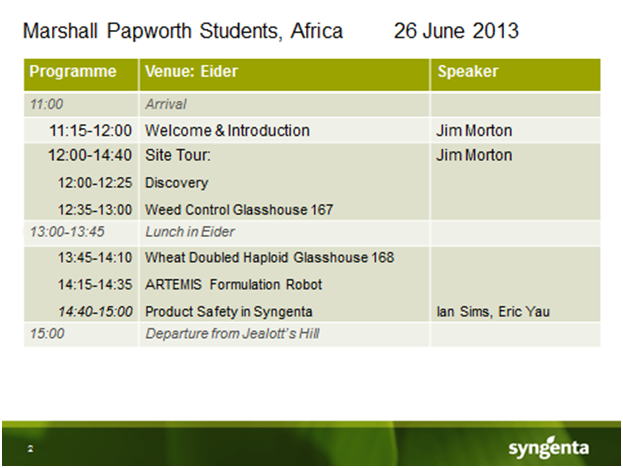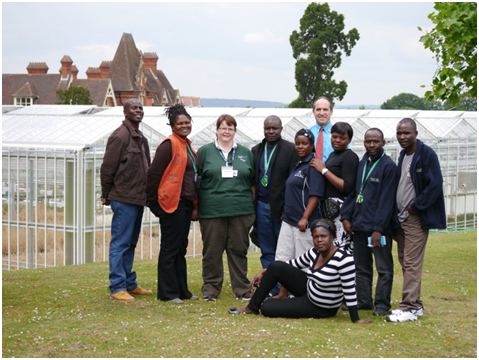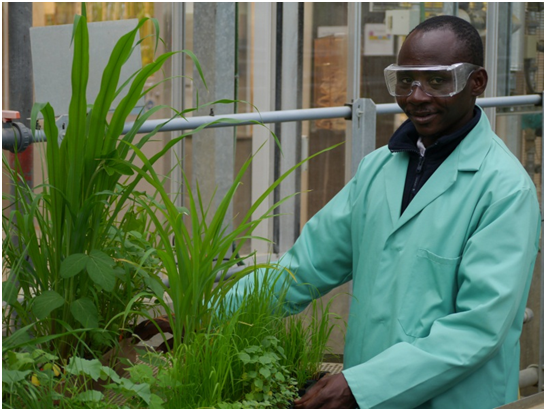Background:
We hosted a group of African students from the ‘Marshall Papworth’ Fund:
www.marshalpapworth.com
These particular students are studying as part of a short course (10 weeks) at Shuttleworth College in Bedford. The students are from different countries Africa and work in key roles for government or local councils (ministries of agriculture/extension services)and take the knowledge given to them on the course to benefit them in their roles to educate farmers and to support their farms better. The Charity sends up to 10 pupils a year and fully funds their stay. This year all 8 Students are based in crop roles and after our contact told them about Syngenta they were very keen to come to visit our research site at Jealott’s Hill.
They were given an overview presentation about Syngenta’s business and our activities and ambitions in Africa. This was then followed by a tour of Jealott’s Hill site incorporating Seeds Research, Crop Protection Discovery, Formulation and Product Safety – emphasizing the international nature of our work here.
Attendees:
Mr Joseph Timothy Before – Malawi
Mr Edward Jumbula – Tanzania
Miss Eliza Uledi – Malawi
Mr Wildon Mnthali Mchina – Malawi
Miss Cecilia Faustine Oswago – Tanzania
Ms Annah Nawa – Zambia
Mr Ibrahim Alhassan – Ghana
Ms Nessah Munthali – Malawi
Katy-May Marriner – Lecturer, Shuttleworth College
Ifor Preece – Agriculture Course Manager, Shuttleworth College
Programme:
Group Photographs:
Name:Ms Annah Nawa
Country: Zambia
Title: Senior Agriculture Supervisor
Background: Responsible for 4800 small scale farmers in conjunction with extension officers. Working with agricultural camps, youth groups, womens’ groups and different cooperatives. Has a farm of 10 acres and holds demonstrations for Monsanto and Syngenta with maize and vegetable varieties. Also work with the Japanese government on an early maturing rice variety.
What have you gained from today’s visit to Jealott’s Hill?
Knowledge of using high technology to improve the high productivity of crops. The reduction of weeds and insects are key to improving yields. I salute your scientists for a job well done – it’s good!
I wish the technology could be spread into developing countries to improve crop yields, particularly Africa, where there are growing populations.
What have you gained from the programme as a whole?
In animal science I have learned more about the identification of diseases: fungal and bacterial. This is critical information for the herd. Biosecurity for the animals and also relating to zoonoses that can affect human health. I have also learnt more about ‘animal freedom’ – in my country the treatment of the animals is not always the best.
In crop production I have learned about the importance of good soils in relation to good yields, the importance of improving the genetics of crops for improved vigour and resistance to disease and drought.
I have also learnt about machinery that can be used on the farm.
The course has been a real eye-opener including a broad spectrum of activities, particularly land optimization, business planning and crop production. It will be really helpful to my people back home and myself as an individual.
Name: Mr Ibrahim Alhassan
Country: Ghana
Title: Agriculture Extension Agent
Background: The range of my district is 92km. Main crops are maize, soybean, groundnut, yam, sorghum, millet. Biggest challenge is lack of mechanization.
How do you interact with farmers in your country?
I have lots of individual meetings with farmers and farmer groups.
I am on the radio every Sunday from 7-8pm where I speak on agricultural practice. This broadcasts to the whole of the northern region and is a great channel for information. When we open the phone lines for questions it is always very busy!
What have you gained from the programme as a whole?
The most important things I have learned have been around the handling of chemicals, personal protection, measurement of quantities and the disposal of packaging – currently there are bad practices in my country where farmers even throw empty bottles into water.






